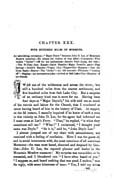
[p. 645]
CHAPTER XXX.
FIVE HUNDRED MILES OF MORMONS.
An astonishing revelation—"Major Doyle" becomes John D. Lee, of Mountain Meadow notoriety—He relates his version of that affair—Comments—Why verdict "Guilty"—Off for the settlements—Jacob's Pool—Long, dry ride—The Pi-Utes—Into Kanab—Jacob Hamlin—Major Powell's party—Pipe Springs—Gould's Ranche—Virgen City—Toquerville—Kanawa—Into the Great Basin—Beaver—The "Jerky"—An old comrade—Fillmore—"Cutting off"—Staging—An unconscious joke—Arrival at Salt Lake City—Surprise of my friends.
I WAS out of the wilderness and across the river; but still a hundred miles from the nearest settlement, and five hundred miles from Salt Lake City. But a surprise of no ordinary kind was in store for me. Having been four days at "Major Doyle's," his wife told me so much of his travels and labors for the Church, that I wondered at never having heard of him in the history of Utah. At supper, on the 3d instant, I casually inquired if he knew of such a man in this vicinity as John D. Lee, for the agent had informed me I must cross at Lee's Ferry. "That," he replied, "is what they sometimes call me." "What!" I exclaimed, "I thought your name was Duyle." "So it is," said he, "John Doyle Lee."
I almost jumped out of my chair with astonishment, not unmixed with a feeling of confusion. Here I was the guest of, and in social intercourse with, the most notorious of all notorious Mormons—the man most hated, shunned and despised by Gentiles—John D. Lee, the reputed planner and leader in the Mountain Meadow massacre! My surprise was too sudden to be concealed, and I blundered out: "I have often heard of you." I suppose so, and heard nothing that was good, I reckon," was the reply, with some bitterness of tone: "Yes, I told my wives
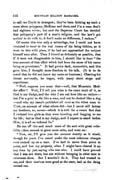
[p. 646]
to call me Doyle to strangers; they've been kicking up such a muss about polygamy, McKean and them, and I'm a man that's had eighteen wives; but now the Supreme Court has decided that polygamy's part of a man's religion, and the law's got nothin' to do with it; it don't make no difference, I reckon."
Of course this was only a subterfuge, but I could not have ventured to recur to the real reason of his being hidden, as it were in this wild place, if he had not approached the subject himself soon after. Then I hinted as delicately as possible, that if it were not disagreeable to him, I should like to hear "the true account of that affair which had been the cause of his name being so prominent." It had grown dark, meanwhile, and this gave him, I thought more freedom in his talk. (It is to be noted that he did not know my name or business.) Clearing his throat nervously, he began, with many short stops and repetitions:
"Well, suppose you mean that—well, that Mountain Medder affair? Well, I'll tell you what is the exact truth of it, as God is my Judge, and the why I am out here like an outlaw— but I'm a goin' to die like a man, and not he choked like a dog —and why my name's published all over as the vilest man in Utah, on account of what others did—but I never will betray my brethren, no, never—which it is told for a sworn fact that I violated two girls as they were kneeling and begging to me for life; but as God is my Judge, and I expect to stand before Him, it is all an infernal lie."
He ran off this and much more of the sort with great volubility; then seemed to grow more calm, and went on:
"Now, sir, I'll give you the account exactly as it stood, though for years I've rested under the most infamous charges ever cooked upon a man. I've had to move from point to point, and lost my property, when I might have cleared it up any time by just saying who was who. I could have proved that I was not there, but not without bringing in other men to criminate them. But I wouldn't do it. They had trusted in me, and their motives were good at the start, bad as the thing turned out.
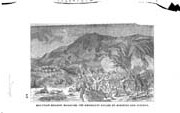
[p. 647]
Mountain Meadow Massacre—132 Emigrants Killed by Mormons and Indians.
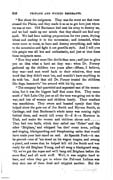
[p. 648]
"But about the emigrants. They was the worst set that ever crossed the Plains, and they made it so as to get here just when we was at war. Old Buchanan had sent his army to destroy us, and we had made up our minds that they should not find any spoil. We had been making preparations for two years, drying wheat and caching it in the mountains; and intended, when worst come to worst, to burn and destroy everything, and take to the mountains and fight it out guerilla style. And I tell you this people was all hot and enthusiastic, and just at that time these emigrants came.
"Now they acted more like devils than men; and just to give you an idea what a hard set they was: when Dr. Forney gathered up the children two years after—fifteen, I believe, they was—and sent word back to their relatives, they sent word that they didn't want 'em, and wouldn't have anything to do with 'em. And that old Dr. Forney treated the children like dogs, hammerin' 'em around with his big cane.
"The company had quarreled and separated east of the mountains, but it was the biggest half that come first. They come south o' Salt Lake City just as all the men was going out to the war, and lots of women and children lonely. Their conduct was scandalous. They swore and boasted openly that they helped shoot the guts out of Joe Smith and Hyrum Smith, at Carthage, and that Buchanan's whole army was coming right behind them, and would kill every G—d d—n Mormon in Utah, and make the women and children slaves and . . . . .They had two bulls, which they called one 'Heber' and the other 'Brigham,' and whipped 'em thro' every town, yelling and singing, blackguarding and blaspheming oaths that would have made your hair stand on end. At Spanish Fork—it can be proved—one of 'em stood on his wagon tongue, and swung a pistol, and swore that he helped kill old Joe Smith and was ready for old Brigham Young, and all sung a blackguard song, 'O, we've got the ropes and we'll hang old Brigham before the snow flies,' and all such stuff. Well, it was mighty hard to bear, and when they got to where the Pahvant Indians was they shot one of them dead and crippled another. But the
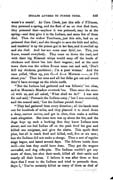
[p. 649]
worst's a comin'. At Corn Creek, just this side o' Fillmore, they poisoned a spring, and the flesh of an ox that died there, they poisoned that—anyhow it was poisoned, may be at the spring—and they give it to the Indians, and some few of them died. Then the widow Tomlinson, just this side, had an ox poisoned that died; and she thought to save the hide and taller, and renderin' it up the poison got in her face, and it swelled up and she died. And her son come near dyin', too. This, you know, roused everybody. They come on down the road, and with their big Missouri whips would snap off the heads of chickens and throw 'em into their wagons; and at the next town there was the widow Evans come out and said, 'Don't kill my chickens, gentlemen; I'm a poor woman.' And the man yelled, 'Shut up, you G—d d—n Mormon—, or I'll shoot you.' Then her sons and all her folks got out and swore they'd have revenge on the whole outfit.
"But the Indians had gathered and was followin' 'em close, and at Mountain Meadow overtook 'em. Then came the council with us, and all asked, 'What shall we do?' I was sent for and said, 'Persuade the Indians away;' but I was overruled, and the council said, 'Let the Indians punish them.'
"They had gathered from every direction; all the bands were out for hundreds of miles, and they planned it to crawl down a deep, narrow ravine, and get in close, then make a sudden rush altogether. But some men was up about the fire, and the dogs kept up such a barking that they knew Indians were about, and one fool Indian off on the peak fired his gun and killed one emigrant, and give the alarm. This spoilt their plan, but all in reach fired and killed, well, five or six men; but the Indians did not make a charge. Then a sort of regular siege begun, and lasted several days. The fellows inside done well—the best they could have done. They got the wagons corralled, and dug rifle-pits. The Indians couldn't get any more of them, but shot their stock, killed all their cattle and nearly all their horses. I believe it was after three or four days that I went to the Indians and tried to persuade them. Says I, 'You've certainly killed as many of them as died of
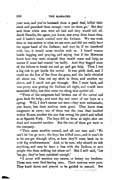
[p. 650]
your men, and you've harassed them a good deal, killed their stock and punished them enough—now let them go.' But they said these white men were all bad and they would kill all. Jacob Hamlin, the agent, you know, was away from home then, and I hadn't much control over the Indians. We was weak then in that section to what we are now, and did not really have the upper hand of the Indians; and may be, if we interfered with 'em, it would cause trouble with us. I heard women inside begging and praying, and saying that if the Mormons knew how they were situated they would come and help, no matter if some had treated 'em badly. And they begged some of the fellows to break out and go and get help. Then I run a big risk to get inside the corral. It was pitch dark, and I could see the line of tire from the guns, and the balls whistled all about me. One cut my shirt in front, and another my sleeve, and I could not get through. But I went back, and was pretty near getting the Indians all right, and would have succeeded fully, but then come the thing that spoiled all.
"Three of the emigrants had broken out of the corral and gone back for help; and next day met some of our boys at spring. Well, I don't excuse our men—they were enthusiastic, you know, but their motives were good. They knew these emigrants at once; one of them was the man that insulted widow Evans, another the one that swung his pistol and talked so at Spanish Fork. The boys fell on them at sight, shot one dead and wounded another. But the two of them got back to the company.
"Then came another council, and all our men said: 'We can't let 'em go now; the boys has killed some, and it won't do to let one get through alive, or here they'll come back on us with big reinforcements.' And, to be sure, why should we risk anything, and may be have a fuss with the Indians, to save people who done nothing but abuse us? But I still said, 'Let 'em go; they've been punished enough.'
"I never will mention any names, or betray my brethren. Those men were God-fearing men. Their motives were pure. They knelt down and prayed to be guided in council. But
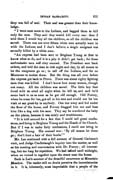
[p. 651]
they was full of zeal. Their zeal was greater than their knowledge.
"I went once more to the Indians, and begged them to kill only the men. They said they would kill every one: then I told them I would buy all the children, so all the children was saved. There was not over fifteen white men actually went in with the Indians, and I don't believe a single emigrant was actually killed by a white man.
"An express had been sent to Brigham Young at first to know what to do, and it is a pity it didn't get back; for those enthusiastic men will obey counsel. The President sent back orders, and told the man to ride night and day, by all means to let the emigrants go on; to call off the Indians, and for no Mormons to molest them. But the thing was all over before the express got back to Provo. There was about eighty fighting men that was killed. I don't know how many women, though not many. All the children was saved. The little boy that lived with us cried all night when he left us, and said he'd come back to us as soon as he got old enough. Old Forney, when he come for 'em, got all in his tent and would not let 'em visit or say good-by to anybody, One run away and hid under the floor of the house, and Forney dragged him out and beat him like a dog with his cane. They say he murdered the baby on the plains, because it was sickly and troublesome.
"It is told around for a fact that I could tell great confessions, and bring in Brigham Young and the Heads of the Church. But if I was to make forty confessions, I could not bring in Brigham Young. His counsel was: 'By all means let them go; don't hurt a hair of their heads.'"
Mr. Lee continued with a full account of General Carleton's visit, and Judge Cradlebaugh's inquiry into the matter, as well as his meeting and conversation with Dr. Forney; all interesting, but too long for repetition. We had talked until midnight, when we turned in together upon the straw near the house.
Such is Lee's account of the dreadful occurrence at Mountain Meadow. The reader will no doubt perceive the inconsistencies in it. It is, inherently, most improbable that a people of the
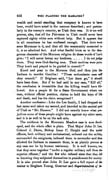
[p. 652]
wealth and social standing that company is known to have been, would have acted in the manner described; and particularly in the enemy's country, as Utah then was. It is too well proven, also, that all the Pahvants in Utah could never have captured eighty white men without help. But it appears that in all conscience he has confessed enough. That there were some Mormons in it, and that all the community consented to it, is an admitted fact. And what fearful hints as to the dangerous character of the Mormon religion do these words of Lee's give: "I will never betray my brethren. . . . . I do not judge them. They were God-fearing men. Their motives were pure. They knelt and prayed to be guided in council!"
Kneel and pray to the Mormon God, and then join the Indians to murder Gentiles! "Those enthusiastic men will obey council." If Brigham said, "Let them go," it should have been done. But if he had said in any case, "Kill all," the conclusion is irresistible that the killing would have followed. Are a people fit for a State Government where one man, without official position, claims to hold the keys of life and death, and has his claim recognized?
Another confession: Like the Lee family, I had dropped my last name and taken my second, and traveled to the central part of Utah as "Mr. Hanson." I did not exactly know what prejudices some of these people might have against my other name, and it is as well to be on the safe side.
The evidence in the Mountain Meadow use is now developed, and the whole affair is plain. That Major John D. Lee, Colonel J. Dame, Bishop Isaac C. Haight and the under officers, both military and ecclesiastical, ordered out the militia, surrounded the emigrants, induced them to surrender and then allowed the Indians to massacre them, is as plainly proven as any case can be by human testimony. It is well known, too, that they came together "under a regular military call from the superior officers;" and the few who refused state that they did so knowing they subjected themselves to punishment for mutiny. It is also proved that John D. Lee gave a full report of the matter to Brigham Young, Governor and Superintendent ofIn-
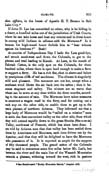
[p. 653]
dian Affairs, in the house of Apostle E. T. Benson in Salt Lake City.*
If John D. Lee has committed no crime, why is he hiding in a desert, a hundred miles out of the jurisdiction of Utah Courts, where he can take home and boat any minute and in three hours be among wild Indians in alliance with the Mormons? Is it because his high-toned honor forbids him to "bear witness against his brethren?" Bosh!
At sunrise of Independence Day I bade the Lees good-bye, and struck southwest and down the Colorado, to get to the plateau and trail leading to Kanab. At Lees, in the mouth of Pahreah Cañon, is the only spot on the Colorado, for three hundred miles, where there is open land enough to make a farm or support a ferry. He has a rich flat, shut in above and below by precipitous cliffs of red sandstone. The climate is singularly mild and pleasant. The summers are not hot, except when a southeast wind blows the air back into the cañon; then it becomes stagnant and sultry. The winters are so warm that wheat can be sown at any time within the three months, according to the amount of rain. The Mormons have taken measures to construct a wagon road to the ferry, and for cutting out a rock way on the other side, to enable them to get up to the main plateau of northern Arizona. They informed me that a large body of Mormons would be "called on a mission" soon to settle the first convenient valley on the other side, from which they will extend rapidly down to the great Sinoita (Sin-o-eeta) Valley, northwest of Prescott, which has since been done. I am told by Prescott men that that valley has been settled three times by Americans and Mexicans, each time driven out by the Apaches; and that they will be delighted to have the Mormons take possession of it. It is reported as ample for the support of fifty thousand people. The grand cañon of the Colorado may be said to commence some five miles below Mr. Lee's, but between the river and the main line of the Wasatch Mountains extends a plateau, widening toward the west, rich in pasture
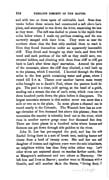
[p. 654]
and with two or three spots of cultivable land. Some three weeks before three miners had constructed a raft above Lee's place, and attempted to run down the river, examining the bars as they went. The raft was dashed to pieces in the rapids three miles below where I made my perilous crossing, and the men narrowly escaped with their lives. They were so near the northern shore that the first eddy enabled them to reach it. Here they found themselves under an apparently inaccessible cliff. They dived and brought up their tools, and from drift wood and such portions of the raft as they could save, constructed ladders, and climbing with them from cliff to cliff, got back to Lee's after three days' starvation. Around the point of the mountain, above the cliff they climbed, a trail leads up to the plateau, which I traveled. I hurried through the fifteen miles to the first gulch containing water and grass, where I rested till 2 p. m. Thence over another barren mesa twenty miles brought me to Jacob's Pool, where the pasture lands begin. The pool is a clear, cold spring, at the head of a gulch, sending out a stream the size of one's wrist, which runs two or three hundred yards down the plain before it disappears. The largest mountain streams in this section never run more than a mile or two on to the plain. In some places a channel can be traced nearly to the Colorado. The Wasatch here has an average elevation of five thousand feet above this plateau; from the mountains the country is tolerably level out to the river, which runs in another narrow gorge some four thousand feet deep. There are three places in a hundred miles where horses and footmen can get down through side gulches to the river.
John D. Lee has pre-empted the pool, and has his wife Rachel living there in a sort of brush tent, making butter and cheese from a herd of twenty cows. She and her son and daughter of sixteen and eighteen years were the sole inhabitants, no neighbors within less than forty miles either way. Lee's other wives are scattered about on ranches farther north; four at Mangrum's settlement and two others at Harmony. One left him and lives at Beaver; another went to Montana with a Gentile, and still another is in the States, "living fancy, I
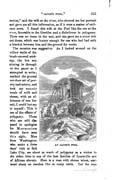
[p. 655]
reckon," said the wife at the river, who showed me her portrait and gave me all this information, as if it were a matter of ordinary news. I found this wife at the Pool like the one at the river, favorable to the Gentiles and a disbeliever in polygamy. There was no room in the tent, and she gave me a straw tick out doors, which was luxury enough for one who had had only a blanket between him and the ground for weeks.
At Jacob's Pool.
The occasion was suggestive. As I looked around on the willow walls of the brush-covered wickiup, the hot sun shining in through on the paper as I attempted to write; marked the general out-door air of poverty and misery, and took my scanty meals of milk and cheese, with an allowance of one biscuit, I could but say to myself: This is one of the effects of polygamy. Those who are still disposed to apologize for Mormonism should have seen this sight. Men from Washington, who make a three days' visit to Salt Lake City, see about as much of polygamy as a visitor in the olden time to one of the best families of Louisville saw of African slavery. Here is a man with eleven wives, scattered about on ranches like so many cattle. Let the man
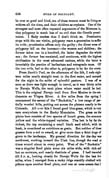
[p. 656]
be ever so good and kind, ten of these women must be living as widows all the time, and their children as orphans. One of the strongest and most often repeated arguments of the Mormons is, that polygamy is much less of an evil than the Gentile prostitution. I flatly confess that I don't think so. Prostitution stops with the one victim, polygamy rears a generation to suffer its evils; prostitution affects only the guilty; the direst woes of polygamy fall on the innocent—the women and children; the former takes one in a hundred, the latter degrades the whole sex; the former has coexisted, and continues, with the highest civilization in the most advanced nations, while the latter is invariably the practice of barbarians and retrograde races. Of the two evils, bad as the other is, polygamy is by far the worst.
From Jacob's Pool, on the afternoon of the 5th, I rode eighteen miles nearly straight west to the first water, and camped for the night in the midst of splendid pasture. I was off as soon as there was light enough to travel, as it was thirty miles to Navajo Wells, the next place where water could be had. This is the original Navajo trail from New Mexico to the settlements on Virgen River. A few miles from the spring I commenced the ascent of the "Buckskin," a low range of partially wooded hills, putting out across the plateau nearly to the Colorado. All over this I found good blue grass, which is very rare everywhere in the Rocky Mountains. The grass on the plains here consists of two species of bunch grass, the common yellow and the white-topped varieties. The last is by far the richest, the top containing a small black seed which, with its husk, is considered as nutritious as grain. But neither of these grasses form a sod or sward, or give more than a faint tinge of green to the landscape. My general direction for the day was northwest, working toward the Utah line, though the road at times wound about to every point. West of the "Buckskin" was a singular flood plain some six miles wide, with rich soil but no moisture, and nearly destitute of grass. I had traveled till 3 P. M., looking closely for Navajo Wells for the last few miles, when I emerged from a rocky ridge scantily clothed with piñons upon another flood plain, and was at once aware that I
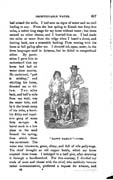
[p. 657]
had missed the wells. I had seen no signs of water and no trail leading to any. From the last spring to Kanab was forty-five miles, a rather long stage for my horse without water; but there seemed no other chance, and I hurried him on. I had made two miles or more from the ridge when I heard a shoout, and looking back, saw a miserable looking Piute coming with his horse at full gallop after me. I shouted toh, agua, water, in the three languages used in Arizona, but he failed to comprehend either.
"Happy Family"—Utes.
By pantomime I gave him to understand that my horse had had no water since sunrise. He exclaimed, "pah to wickiup," and whirling his horse, directed me to follow. Two miles back, and half a mile from my trail, was the water hole, and by it the brush camp of his tribe, a horribly filthy and repulsive gang of some forty savages. A barrel sunk in a low place in the sand formed the spring, from which there was no stream. The water was lukewarm, green, slimy, and full of vile pollywogs. The chief brought an old copper kettle, which my horse emptied three times. I indulged in a half pint, after straining it through a handkerchief. For this courtesy, I divided my stock of meat and cheese with the chief, who suddenly became rather communicative, preferred a request for tobacco, and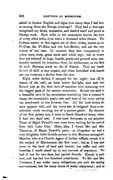
[p. 658]
asked in broken English and signs how many days I had been in coming from the Navajo wikiups? They had at first sight recognized my lariat, moccasins, and beaded scarf and pouch as Navajo work. Each tribe in the mountains knows the work of every other tribe, even when a thousand miles distant. The Indians native to this region are of three tribes, known as the Pi-Utes, the Pi-Edes and the Lee-Biches, and are the very lowest of the race. In summer they fare sumptuously on piñon nuts, roots, grass seeds and white sage; but in winter they are reduced to bugs, lizards, grubs and ground mice, occasionally assisted by donations from the settlements, or the flesh of such Mormon stock as die of disease. They are totally devoid of skill in any respect, and when furnished with boards can not construct a shelter from the rain.
Eight miles farther, I camped for the night; was off by reason of the cold, an hour before daylight, and rode into Kanab just as the first rays of sunshine were streaming over the rugged gaps of the eastern mountains. Kanab sits back in a beautiful cove in the mountains, something like a crescent in shape, the mountain's peaks east and west of the town putting out southward to the Arizona line. All the land within the cove appears rich, and the town site is irrigated from a considerable creek running out of a narrow gulch. By direction of the first person met, I went to Jacob Hamlin's house, where I had two days' rest. I was most fortunate in my selection. Three of Major Powell's men were here, waiting for his arrival from Salt Lake City. Here, also, I found Mr. and Mrs. Thomson, of Major Powell's party; so altogether we had a very delightful little Gentile society in this Mormon stronghold. Hamlin, who is a Church Agent of Indian Affairs, struck it on the subject of Mormonism the first meal; but as I was once more in the land of beef and biscuit, hot coffee and other luxuries, I could stand up to any amount of argument. We had it hot for two days, but parted friends. Kanab is quite new, and has but two hundred inhabitants. To Mr. and Mrs. Thomson, I am under many obligations, not only for writing conveniences, but for many hours of social enjoyment; and as
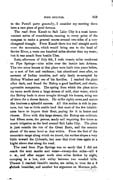
[p. 659]
to the Powell party generally, I consider my meeting them here a rare piece of good fortune.
The road from Kanab to Salt Lake City is a most inconvenient series of roundabouts, running to every point of the compass to make a general course around two sides of a very elongated triangle. From Kanab there is a trail straight north over the mountains, which would bring one to the head of Sevier River, a route one hundred miles shorter than my route; but it was unsafe from hostile Utes.
Late, afternoon of July 8th, I rode twenty miles southwest to Pipe Springs—nine miles over the border into Arizona. The two stone houses at that place were built nine years before, as a sort of fort and residence; but abandoned soon after, on account of Indian troubles, and only lately re-occupied by Bishop Windsor and one of his families. I reached the place after dark, and found the Bishop a good landlord, and chatty, agreeable companion. The spring from which the place takes its name sends down a large stream of cold, clear water, which the Bishop leads in stone troughs through his houses, using one of them for a cheese factory. He milks eighty cows, and makes the business a splendid success. All this section is rich in pasture, but has so little arable land that most of the few inhabitants have to import their flour, paying for it in butter and cheese. Even with this large stream, the Bishop can cultivate but fifteen acres, the porous, sandy soil requiring five times as much irrigation as the land around Salt Lake City. The place is just outside the rim of the Great Basin, and the country about of the same level as that within. From the foot of the mountain range along which we travel, the surface slopes a very little toward the Colorado, but near that river rises again to a hight above that along the road.
The road from Pipe Springs was so sandy that I did not reach the next ranche and water—twenty-five miles—till 4 P.M., and after supper made nine miles farther by night, camping in a low, rich valley between two wooded hills. Thence I reached Gould's ranche, ten miles, in time for a 9 o'clock breakfast, and another hot argument on Mormon poli-
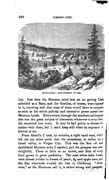
[p. 660]
Kanarra—Southern Utah.
tics.. Just then the Mormon mind was set on getting Utah admitted as a State, and the Gentiles, of course, were opposed to it, knowing well that most of them would have to emigrate as soon as the whole judicial and executive power passed into Mormon hands. Everywhere through the southern settlements this was the great subject of discussion whenever a stray Gentile wandered into town. It may be bad policy to discuss the matter with them, but I can't keep still when an argument is shoved at me.From Gould's I took, by mistake, a right hand road, which led me ten miles north into the mountains, or rather, up a broad valley, to Virgen City. This was the first old and established Mormon town I reached, and the prospect was most delightful. There is little or no winter, and fruit of every kind grows in great perfection. The neat white dobie houses were almost hidden in forests of peach, fig and apple trees, and the fine vineyards rivaled the best in California. "Dixie wine," as the Mormons call it, is rather strong and pungent;
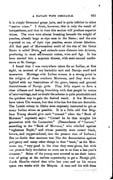
[p. 661]
it is simply fermented grape juice, and is quite inferior to other "native wines." I think, however, this is only the result of inexperience, and that in time this section will produce superior wines. The trees were almost breaking beneath the weight of peaches, already large as ripe ones in the States; and the size reported to me, of their ripe peaches, seems almost fabulous. All that part of Mormondom south of the rim of the Great Basin is called Dixie, and extends some distance into Arizona, producing in most settlements cotton, wine and figs. It has been erected into a separate diocese, with semi-annual conferences at St. George.
I found that I was everywhere taken for an Indian, at first sight, on account of my buckskin suit and Navajo scarf and moccasins. Marriage with Indian women is a strong point in the religion of these southern Mormons, and they were delighted with my descriptions of the grace, beauty and general desirableness of Navajo girls. They fully expect to form a close alliance and lasting friendship with that people by means of intermarriage, and no doubt the scheme is quite practicable and the quickest way to gain the desired result. A few Mormons have taken Ute women, but that tribe has few that are desirable. The Lemhi colony in Idaho were expressly instructed to get as many Indian wives as possible. It is a little odd that Brigham Young should give such "counsel" when the "Book of Mormon" expressly says: "Cursed be he that mingles his generation with the Lamanites." (Descendants of "Laman," according to the "Book of Mormon," who rebelled against "righteous Nephi," and whose posterity were cursed black, brown, and copper-colored, into the present race of Indians.) But no doubt that sentence was like the denunciation against polygamy and many other things in that "book," as the Mormons say, "very good in the time they were given, but with our present daily revelation no more use to us than a last year's almanac." Some of the young men avowed to me their intention of going at the earliest opportunity to get a Navajo girl. Jacob Hamlin visited that tribe last year, and on his return spent two weeks with the Moquis. A man and his wife from
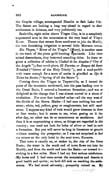
[p. 662]
the Oraybe village, accompanied Hamlin to Salt Lake City. The Saints are looking a long way ahead in regard to their settlements in Arizona, and very judiciously too.
Rockville, eight miles above Virgen City, is in a completely sequestered cove in the mountains at the very head of Virgen River. Thence that stream flows southwest to join the Muddy, the two furnishing irrigation to several little Mormon towns.
Rio Virgen, "River of the Virgin" (Mary), is another name in the track of the pious gold-hunting Spaniards. Like their mixed descendants, they bestowed sounding titles. In these regions a collection of adobes is Ciudad de los Angelos ("City of the Angels"); four scrub pines. El Paraiso, or Bosque del Santo Trinidad ("Grove of the Holy Trinity"); and a mud-puddle with water enough for a some of mules is glorified as Ojo de Todos los Santos ("Spring of all the Saints").
Coming down the Virgen to Toquerville, as I turned the point of the mountain northward, into the pass leading over to the Great Basin, I entered a limestone formation; and was so delighted at the change that I was almost moved to a shout of exultation. For over four hundred miles—all the way west of the divide of the Sierra Madre—I had seen nothing but sandstone; white, red, yellow, gray or conglomerate, but still sandstone. I suppose any kind of rock would grow tiresome in three or four weeks; but it seems to me, when gazing on it day after day, no other can be so monotonous as sandstone. And then it is so unpromising a stone, as things are regarded in this country; one need not look for lodes of silver or lead in such a formation. But you will never be long in limestone or granite without meeting the prospector; so I was not surprised to find six miners at the only hotel in the next town, Kanarra.
That town is exactly on, or rather in, the rim of the Great Basin; the water in the south end of town flows out into the Muddy, and from the north end into the Basin—or toward it—sinking in a few miles. Here I had my first serious misfortune. My horse and I had come across the mountains and deserts in good health and spirits; we both fell sick on reaching the settlements. We had stood adversity; prosperity ruined us. My
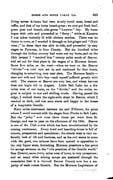
[p. 663]
living across Arizona had been mostly cured meat, bread and coffee, and that of my horse bunch-grass; we now got fresh beef, green peas and biscuit, also green "Lucerne" hay. My horse began with colic and proceeded to "flercy;" while at Kanarra I was taken violently ill with cholera morbus. There was no doctor in town, so I worried it through on hot ginger and "Dixiewine;" in three days was able to ride, and proceeded by easy stages to Parowan, in Iron County. But six hundred miles through the Indian country had worn out my horse, and on the 16th instant I "ranched him" twenty miles south of Beaver, and set out for that place in the wagon of a Mormon farmer. Some five miles on the road—when we were on the Beaver "divide"—a cold rain set in and continued for four hours, changing to something very near sleet. The Mormon family—man and wife and little boy—and myself suffered greatly with cold. The seasons at Beaver are very late, and wheat harvest does not begin till in August. Little Salt Lake lay a few miles west of our route, on the "divide," and the entire region is subject to raw and chilling winds. Having passed the ridge, I walked down the eight-mile slope to Beaver, which I resulted at dark, and was soon warm and happy in the house of a hospitable Gentile.
Sixty miles intervened between me and Fillmore, the point where I could connect with the stages from Pioche to Salt Lake. But the "jerky" now runs three times per week from St. George, and was to pass on the afternoon of the 18th. Beaver is one of the Utah towns which has been revolutionized by the mining excitement. Every hotel and boarding-house is full of miners, prospectors and speculators; the streets wear a very un-Saintly look of life and business, and as the evil seems to come with the good, two saloons have been opened in opposition to the city liquor store, furnishing Mormon preachers a fine point for savage sermons on the "vile practices of the Gentile world." Star District, some thirty miles west of town, is very prosperous; and so many other mining camps are scattered through the mountains that it is claimed Beaver County now has a majority of male voters Gentile. But the Mormon Legislature of
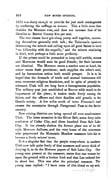
[p. 664]
1870 was sharp enough to provide for just such contingencies by conferring the suffrage on women. This a little more than doubles the Mormon vote, and does not increase that of the Gentiles in Beaver County five per cent.
The two classes have got along pretty well together, contenting themselves generally with talk; the Tabernacle speakers denouncing the miners and calling upon all good Saints to have "no fellowship with the ungodly," and the miners retaliating in kind, with perhaps a little more profanity.
If the priests could be persuaded to keep still awhile, miners and Mormons would soon be good friends; for their interests are identical. The Mormon wants a market near at hand, the miner wants fresh provisions; each supplies the other's need, and by harmonious action both would prosper. It is to be hoped that the demands of trade and mutual intercourse will soon overcome religious fanaticism, and in spite of priestly intolerance Utah will ere long have a homogeneous population. The military post just established at Beaver adds much to the importance of the place; it makes trade lively among the Saints, and the officers and their families add greatly to the Gentile society. A few miles south of town Fremont's road crosses the mountains through Paragoonah Pass to the Sevier country.
New mining districts are being opened all over southwestern Utah. The latest sensation is the Silver Belt, some forty miles southwest of Cedar City, and three hundred from Salt Lake City. It has already shaken the former place out of its old style Mormon dullness, and the very home of the miscreants who perpetrated the Mountain Meadow massacre bids fair to become a lively miners' town.
It is a singular fact that the people everywhere in southern Utah now talk quite freely of that massacre and never think of denying it, as do the Mormon papers of Salt Lake City. One young man present at the massacre, states that one woman lay upon the ground with a broken limb and that Lee ordered him to shoot her. This was after the principal massacre. The young man replied: "I have none of this blood on my soul,

[p. 665]
and I won't have any." Lee threatened him with death, and then shot the woman through the head. It is one of the strangest things in American history that there should be so much evidence, and so easily obtainable, upon this affair, and yet no legal inquiry made. The jury system and the peculiar statutes of Utah explain it. If a decided majority of the inhabitants of any county in Ohio should decide that a certain crime should not be punished, all the authorities of the State could not punish it. No grand jury regularly impanelled will indict, and no petit jury convict. The general feeling among Mormons is, that though those men are guilty, the Church has posed upon their case and handed them over to the "buffetings of Satan," and the civil law has no business with it.
Climbing upon the "jerky," at Beaver, I was pleased to recognize in the driver my old friend Will Kimball, who drove a team across the Plains in the same train as I did in 1868. Kimball's father was one of the many arrested the previous winter on charges relating to the conduct of the Mormon militia, in the rebellion of 1857, but was released with a hundred and twenty others, when the Supreme Court reversed Judge McKean's rulings. In the progress of Utah affairs nearly all of the family left by old Heber Kimball have become pretty good Gentiles. This seems to be the course of all such delusions which do not end in blood.
The original force of fanaticism wears itself out. It may be compared to one of Utah's mountain streams, which plunges from a rocky gulch in torrents that threaten to tear up the whole country below. Five miles down the plain it has become a gentle rivulet or sluggish stream; five miles further there is a channel of dry sand, with here and there a brackish pool. Thus with the Irvingites, Muggletonians, etc., and so with this delusion. Old Mormons die; young ones grow up infidels, and the system moderates to a mild Protestantism. Kimball and I were the only occupants, and had a delightful evening ride to Fillmore, which we reached soon after midnight. There I went to sleep in the "jerky," to wait for the Pioche stage, expected in two hours, and slept so sound that all their racket
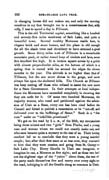
[p. 666]
in changing horses did not waken me, and only the morning sunshine in my face brought me to a consciousness that, willy nilly, I was to spend a day in Fillmore.
This is the old Territorial capital, something like a hundred and seventy-five miles southwest of Salt Lake, and quite a beautiful town. Several wealthy Mormons reside here, in elegant brick and stone houses, and the place is old enough for all the shade trees and shrubbery to have attained a good growth. Some thirty miles west of Fillmore is a remarkable mountain peak, or rather round heap of cinders and lava, some five hundred feet high. It is broken square across by a gulch with almost perpendicular sides, at the bottom of which is a spring that is coated with ice around the edges for eleven months in the year. The altitude is no higher than that of Fillmore, but the sun never shines in the gorge, and snow always lies upon the sheltered hills. The Church at Fillmore was busy cutting off those who refused to assist the new move for a State Government. In their attempts at local independence the Mormons have succeeded completely in showing that they are unfit for it. Of some two hundred Mormons, the majority women, who voted and petitioned against the admission of Utah as a State, every one has been cited before the Council and forced to publish a recantation or be "cut-off, and delivered over to the buffetings of Satan." Such is a "free vote" under an "infallible priesthood."
We got on the road by 2 A. M., of the 20th, my companions being three miners and two "girls" from Pioche, and a young man and woman whom we could not exactly make out, and who soon became quite a mystery to the rest of us. Their loving conduct led us to conclude that they were a young married couple; but, after their first scare at us was over, they ventured to hint that they were cousins, and going from St. George to Salt Lake City. Every Gentile in Utah can recognize, or imagines he can, a Mormon at first sight; and as these two had not the slightest sign of the "yahoo" about them, the rest of the party made themselves free and merry over every sight on the road, indulging in all the Gentile slang so common in Utah.
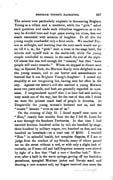
[p. 667]
The miners were particularly emphatic in denouncing Brigham Young as a villain and a murderer, while the "girls" asked such questions and made such ridiculous suggestions as to the way he divided time and kept peace among his wives, that our coach resounded with screams of laughter. To all this the young couple vouchsafed only a faint smile. We reached Payson at midnight, and learning that the next coach would not go on till 8 A. M., the "girls" took a room in the stage hotel, the miners and myself took to the stable-loft, while the young couple concluded to remain in the coach the rest of the night. Of course this was well enough for "cousins," but then "some people will make remarks." Where we stopped at dinner next day, at Spanish Fork, the Mormon family were delighted to see the young woman, and to our horror and astonishment we learned that it was Brigham Young's daughter! I cursed my stupidity at not recognizing her, having seen her often in the city. Against her father's will she married a young Mormon some two years since, and both are generally regarded as apostates. I congratulated myself that I at least had said nothing very much out of the way, but for the rest of that ride I think we were the quietest coach load of people in America. At Draperville the young woman's husband met us, and the "cousin" became "even as one of us."
On the evening of July 21, I found myself once more in "Zion," exactly four months from the day I left St. Louis for a tour through the Southern Territories. In that time I had traveled fourteen hundred miles by rail, six hundred by stage, three hundred by military wagon, two hundred on foot, and six hundred on horseback—at a total cost of $535. I reached "Zion" in splendid health, but complete disguise, if I am to judge from the conduct of my friends, many of whom passed me on the street without a nod, or with only a slight look of curiosity, as if some old and half-forgotten memory were stirred by sight of a face that "had a sort of familiar look." However, after a bath in the warm springs, getting off my buckskin pantaloons, spangled Mexican jacket and Navajo scarf, and donning a new summer suit, my fingers received once more the
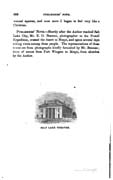
[p. 668]
wonted squeeze, and once more I began to feel very like a Christian.
PUBLISHERS' NOTE.—Shortly after the Author reached Salt Lake City, Mr. E. O. Beaman, photographer to the Powell Expedition, crossed the desert to Moqui, and spent several days taking views among those people. The representations of those towns are from photographs kindly furnished by Mr. Beaman; those of scenes from Fort Wingate to Moqui, from sketches by the Author.
SALT LAKE THEATRE.